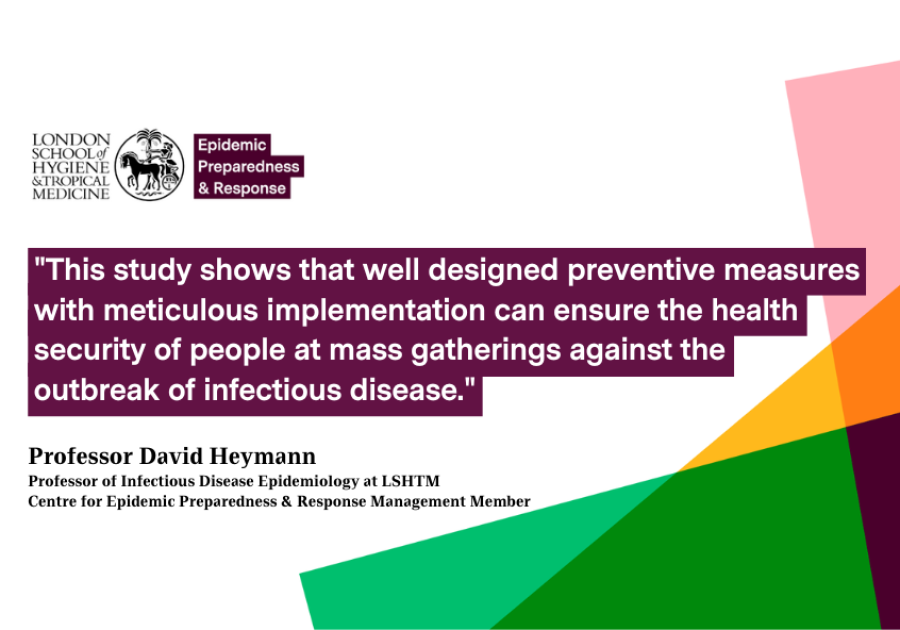
Extensive public health actions and planning meant the Tokyo Summer Olympic Games in 2021 and the 2022 Beijing Winter Olympic Games did not become COVID-19 super-spreader events in their host cities or further afield, according to a Health Policy piece published in The Lancet.
The researchers, many of whom are members of the Mass Gatherings Expert Group and WHO Health Emergencies Programme, highlight that if rigorous risk assessment, management and communication measures are put in place, it is possible to host a major international mass gathering safely during a pandemic.
The Games acted as a unique research environment, according to the study’s lead author Dr Brian McCloskey, Honorary Professor at LSHTM and Senior Consulting Fellow at Chatham House.
He said: “The Tokyo and Beijing Olympic Games provided a unique opportunity to analyse the epidemiology of COVID-19 in a controlled environment in a mass gathering. The extensive testing regime at both Games meant we could track all cases of COVID-19 and their contacts in a well-defined setting and examine the impact of the infection countermeasures we had put in place.”
In their analysis, the researchers found the numbers of cases of COVID-19 were very low; 464 positive tests from around 676,000 tests in Tokyo and 437 positive tests from around 1.85 million tests in Beijing. The proportion of those testing positive who were detected in less than 14 days was 72% in Tokyo and 98% in Beijing, and no positive cases at either Games led to serious health consequences. The study also highlighted that genomic sequencing showed there was no significant spread either from participants to the host cities or from participants to their home countries when they returned.
To achieve this, there were extensive COVID-19 testing and contact tracing strategies implemented for all those involved. In Tokyo, participants had to take two PCR tests before departing for Japan followed by a saliva rapid antigen test on landing. In Beijing, two pre-departure PCR tests were required followed by a PCR test on landing. Throughout both Games, daily testing took place for participants, with pre-departure testing required before they left Japan and China to return to their home countries. In all cases, extensive contact tracing was done on all positive test results.
Similarly, social public health measures were enforced including a “closed loop” system where Games participants and the general public remained separated with movement only allowed between pre-agreed locations via dedicated transport. Social distancing and compulsory mask wearing were enforced throughout both Games via staggered mealtimes for athletes and ensuring shared accommodation was equipped with effective ventilation systems.
Dr McCloskey said: "The results show that it is possible to manage mass gathering events in a pandemic with a careful and appropriate approach to risk assessment, risk management and risk communication. Importantly, the success of the outbreak measures used prove that the fundamental approach to outbreak control using public health and social measures, test and trace, and vaccination is an effective way to reduce the risk of spread of infectious diseases.”
Looking ahead to future large-scale events outside of a pandemic scenario, Dr McCloskey explained that the study showed that the 2024 Olympic event organisers “can be more confident that COVID-19 need not unduly disrupt the Games.”
Co-author Professor David Heymann, Professor of Infectious Disease Epidemiology at LSHTM, said: "The results of this study provide a roadmap for preventing outbreaks of respiratory infections at other events where there are mass gatherings such as concerts, as well as sporting and religious events – they demonstrate that well designed preventive measures with meticulous implementation can ensure the health security of all who take part.”
The researchers also concluded that routine public health and social measures, as used throughout the Olympics, are generally effective in reducing the spread of infectious diseases, like COVID-19, and that an effective test, trace and isolate programme coupled with high vaccination rates helped further drive down virus spread.
Co-author Sir Ali Zumla, Professor of Infectious Diseases and International Health at University College London said: “Research such as this requires global co-operation and pooled international expertise, working closely together, to generate impactful results.”
Read the full article The Tokyo 2020 and Beijing 2022 Olympic Games held during the COVID-19 pandemic: planning, outcomes, and lessons learnt in the Lancet.
If you enjoyed this article and would like to build a career in global health, we offer a range of MSc programmes covering health and data, infectious and tropical diseases, population health, and public health and policy.
Available on campus or online, including flexible study that works around your work and home life, be part of a global community at the UK's no.1 public health university.
